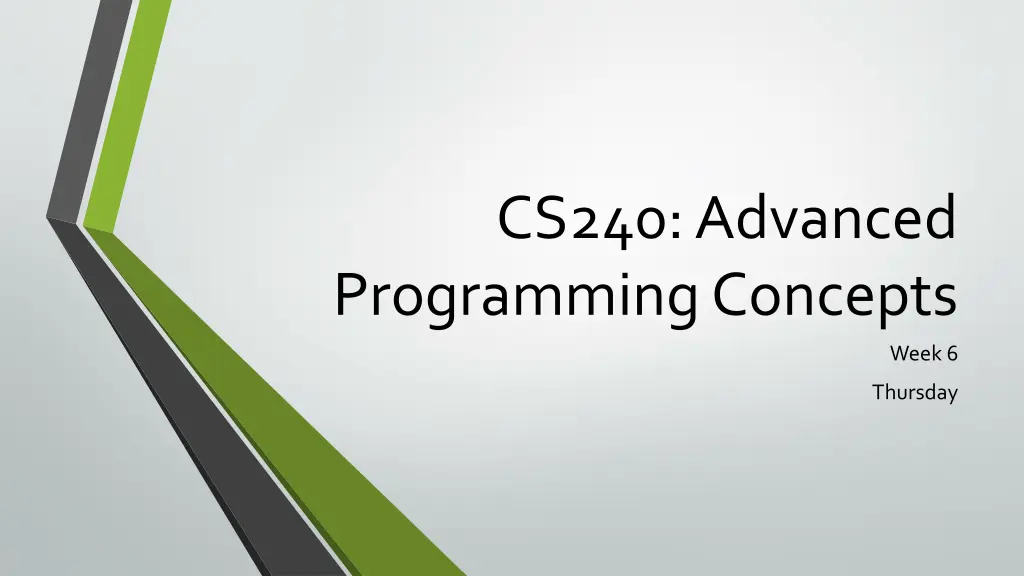
Advanced Programming Concepts: Study Materials and Best Practices
Dive into advanced programming concepts such as decomposition, algorithm selection, minimizing dependencies, and interface implementation. Explore resources for Java, JUnit testing, SQLite, JSON, and Android development to enhance your programming skills and understand best practices for effective code design.
Download Presentation

Please find below an Image/Link to download the presentation.
The content on the website is provided AS IS for your information and personal use only. It may not be sold, licensed, or shared on other websites without obtaining consent from the author. If you encounter any issues during the download, it is possible that the publisher has removed the file from their server.
You are allowed to download the files provided on this website for personal or commercial use, subject to the condition that they are used lawfully. All files are the property of their respective owners.
The content on the website is provided AS IS for your information and personal use only. It may not be sold, licensed, or shared on other websites without obtaining consent from the author.
E N D
Presentation Transcript
CS240: Advanced Programming Concepts Week 6 Thursday
Things to study Things To Study JSON http://www.json.org/ SQLite https://www.sqlite.org/about.html JavaDoc/javadoc https://students.cs.byu.edu/~cs240ta/fall2016/tutorials/Java_Doc_Tutorial.pdf Junit Testing http://www.vogella.com/tutorials/JUnit/article.html Android Book: Chapters 3 - 5
Decomposition Levels of decomposition System Subsystem Packages Classes Routines Hypo- and Hyper-Decomposition When have we decomposed far enough? Size metrics Complexity metrics Single responsibility
Algorithm & Data Structure Selection No amount of decomposition or abstraction will hide a fundamentally flawed selection of algorithm or data structure.
Minimize Dependencies Dependencies Class A CALLS Class B Class A HAS MEMBER OF Class B Class A INHERITS FROM Class B
Minimize Dependencies Minimizing the number of interactions between different classes has several benefits: A class with few dependencies is easier to understand A class with few dependencies is less prone to ripple effects A class with few dependencies is easier to reuse
Minimize Dependencies When classes must interact, if possible they should do so through simple method calls This kind of dependency is clear in the code and relatively easy to understand
Separation of Interface and Implementation Maintain a strict separation between a class interface and its implementation This allows internal details to change without affecting clients interface Stack+ class StackImpl Program to interfaces instead of concrete classes
Information Hiding Many languages provide public , private , and protected access levels All internal implementation is private unless there s a good reason to make it protected or public A class public interface should be as simple as possible
Information Hiding Don t let internal details leak out of a class ClassRoll instead of StudentLinkedList Some classes or methods are inherently tied to a particular implementation. For these it is OK to use an implementation-specific name HashTable TreeSet
Code Duplication Code duplication should be strenuously avoided Identical or similar sections of code Disadvantages of duplication: N copies to maintain Bugs are duplicated N times Makes program longer, decreasing maintainability Solutions Factor common code into a separate method or class Shared code might be placed in a common superclass
